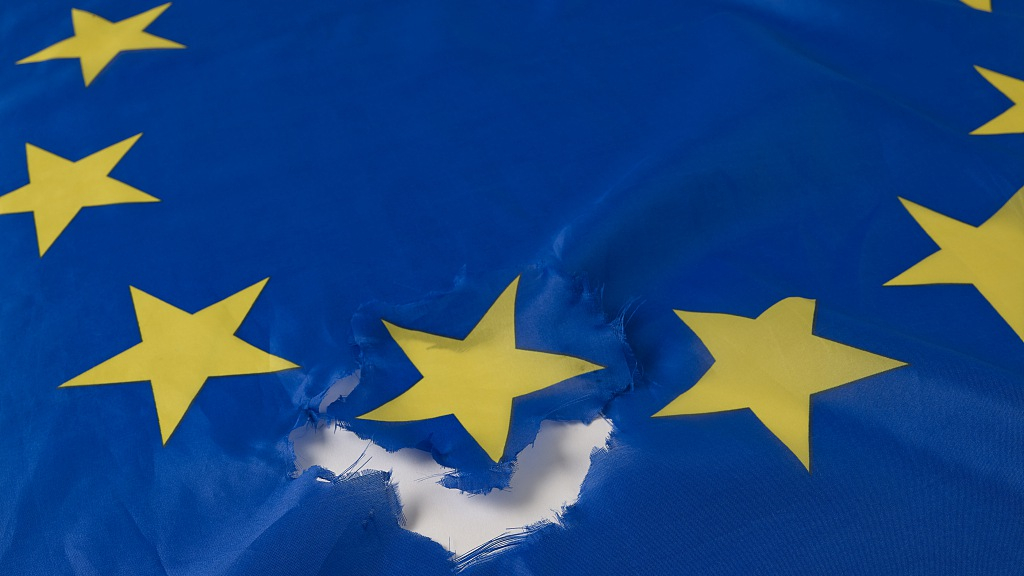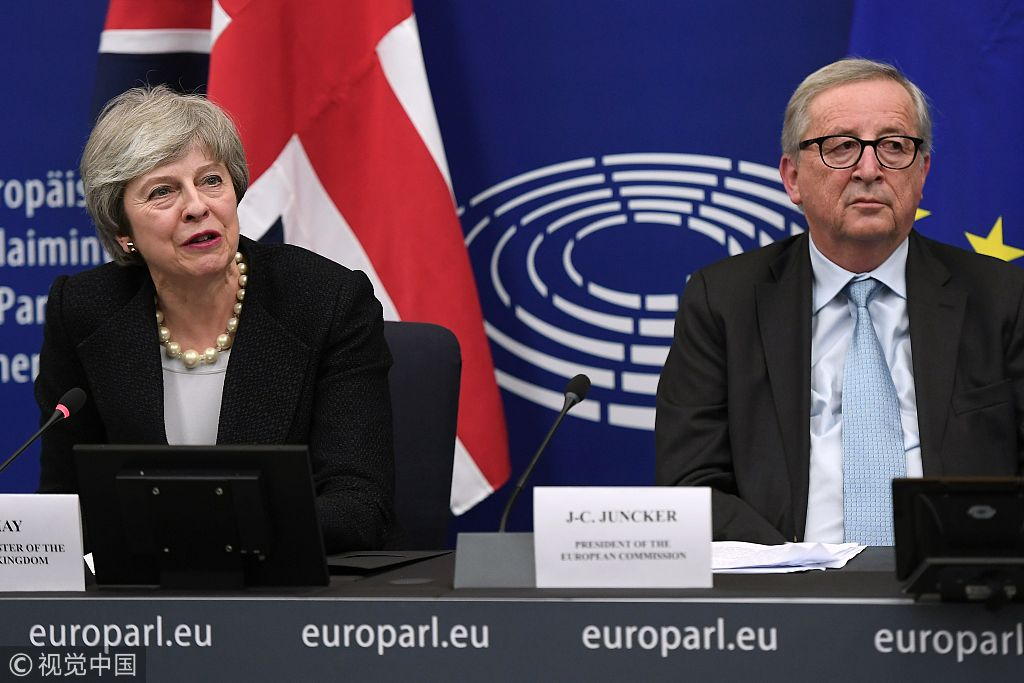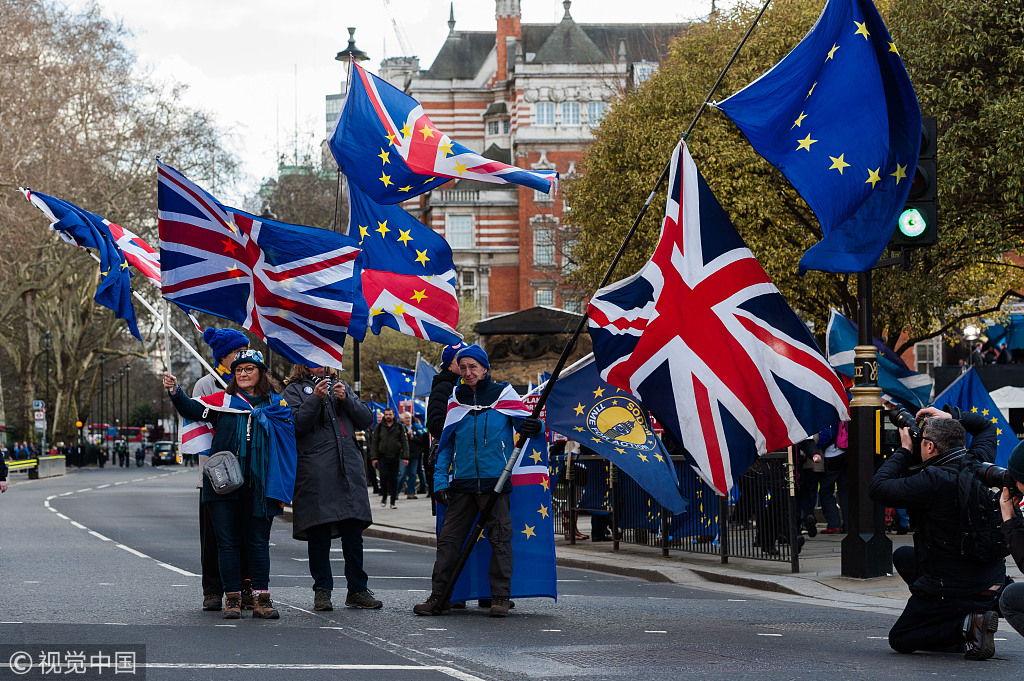
Opinion
19:08, 12-Mar-2019
The critical moment for Brexit
Yizhe Daniel Xie

Editor's Note: Yizhe Daniel Xie is a visiting PhD Scholar at London School of Economics and Political Science. The article reflects the author's opinion and not necessarily the views of CGTN.
No doubt, this week is poised to shape Britain's future as Westminster MPs meet to vote on a revised Brexit deal, potentially two or three votes on “no deal” and “delay the Brexit.”
A day ahead of the crucial voting, UK Prime Minister Theresa May secured “legally binding changes” to her Brexit deal in Strasbourg with Jean-Claude Juncker, President of the European Commission.
May's hoarse voice with exhaustion and Junker's explicit warning with an uncomfortable face at a late-night joint press conference proved the negotiation was extremely tough and doubtless final.

European Commission President Jean-Claude Juncker (R) and British Prime Minister Theresa May give a press conference following their meeting in Strasbourg, France, March 11, 2019. /VCG Photo
European Commission President Jean-Claude Juncker (R) and British Prime Minister Theresa May give a press conference following their meeting in Strasbourg, France, March 11, 2019. /VCG Photo
Three major changes were agreed. First, a joint legally binding instrument prevents the EU from acting with the intent of applying the backstop perpetually.
Second, the two parties are obliged to replace the backstop with alternative arrangements by December 31, 2020.
Third, a unilateral declaration (the EU may disagree with UK's position) was made to outline the UK's position to remove itself from the backstop arrangement if discussions on the future relationship with the EU break down and there is no prospect of a subsequent arrangement.
Apparently, the EU wants to help May to win, but that is probably the best it can offer. In spite of the previous insistence of no renegotiations, Junker compromised to allow clarification and interpretation by playing on words.
But, nobody in Brussels fancies another negotiation fatigue, which lasted over two years and was ultimately rejected by the UK MPs. In addition, deep splits in the British parliament and society over Brexit make it impossible to renegotiate key clauses of the existing agreement.
The new deal serves the best interests of both sides. For May, the changes address the top concern in parliament over the Northern Ireland backstop, which theoretically can trap the UK in the EU indefinitely, and deliver referendum result.
From the view of the European Union, a slight compromise may be necessary to save the nearly 600 pages long existing Brexit agreement.
A scheduled Brexit at the end of March 2019 will remove uncertainties and business risks across the region, and it will also allow Brussels to claim approximately 39-billion-pound financial settlement (known as divorce bill) from the UK to fill EU budget.
Most importantly, the critical part of the existing agreement regarding the backstop plan remains intact.

Pro-EU supporters protest outside the Houses of Parliament in London, the United Kingdom, March 11, 2019. /VCG Photo
Pro-EU supporters protest outside the Houses of Parliament in London, the United Kingdom, March 11, 2019. /VCG Photo
A backstop agreement is a core part of the agreement. It provides insurance to frictionless cross-border movements of goods and people between Republic of Ireland and Northern Ireland, when the UK and the EU cannot reach an agreement on their future relationship by the end of the transition period (December 31, 2020).
Reestablishing a hard Irish border is unthinkable and disastrous. Without mentioning enormous economic damage expected on both economies, it undermines the 1998 Good Friday Agreement or Belfast Agreement – an international and multi-party agreement to end decades-long troubles and violence that caused roughly 3,500 lives on both sides.
And, it could reignite conflicts between nationalists and unionists in the region. That explains why the UK and the EU have repeatedly stated that avoiding a physical border in Ireland is unshakable commitments for them and the international community as a whole.
In an unsurprising move, Irish Prime Minister Taoiseach Leo Varadkar delayed his St Patrick's visit to the White House in this critical time.
The hard-fought revision, probably the best Downing Street can get, might have temporarily removed a deadlock and strengthened British pound. However, it may not be enough to guarantee a win on Tuesday evening.

British conservative MP Jacob Rees-Mogg (C), chair of the pro-Brexit European Research Group (ERG), walks in the street outside the Houses of Parliament in London with anti-Brexit campaigner Steve Bray alongside him, March 12, 2019. /VCG Photo
British conservative MP Jacob Rees-Mogg (C), chair of the pro-Brexit European Research Group (ERG), walks in the street outside the Houses of Parliament in London with anti-Brexit campaigner Steve Bray alongside him, March 12, 2019. /VCG Photo
May's January historical defeat by a record margin of 230, where nearly 40 percent of her own conservative MPs voted against her, means she has to seal a new deal with substantial changes in order to persuade both labor and conservative parties.
Yet, in the eyes of many MPs, the revised version fails to achieve the goal of removing the risks of trapping in the European Union, at best, it merely reduces the risk.
As for now, it is all about British politics as the ball has been passed to the Westminster. Independent legal advice on May's new deal from Attorney General Geoffrey Cox will surely influence MPs' votes.
At this moment, May's top priority is to mobilize her resources to convince Jacob Rees-Mogg from the Conservatives, chairman of the Eurosceptic European Research Group (ERG), and Arlene Foster, leader of Democratic Unionist Party (DUP) in Northern Island, to back her deal.
If she can bring them on her side, the United Kingdom is likely to leave the European Union officially in less than three weeks.
To be fair, May indeed has an exceptionally difficult job to please everyone given the nation is sharply divided over Brexit.
(If you want to contribute and have specific expertise, please contact us at opinions@cgtn.com.)

SITEMAP
Copyright © 2018 CGTN. Beijing ICP prepared NO.16065310-3
Copyright © 2018 CGTN. Beijing ICP prepared NO.16065310-3